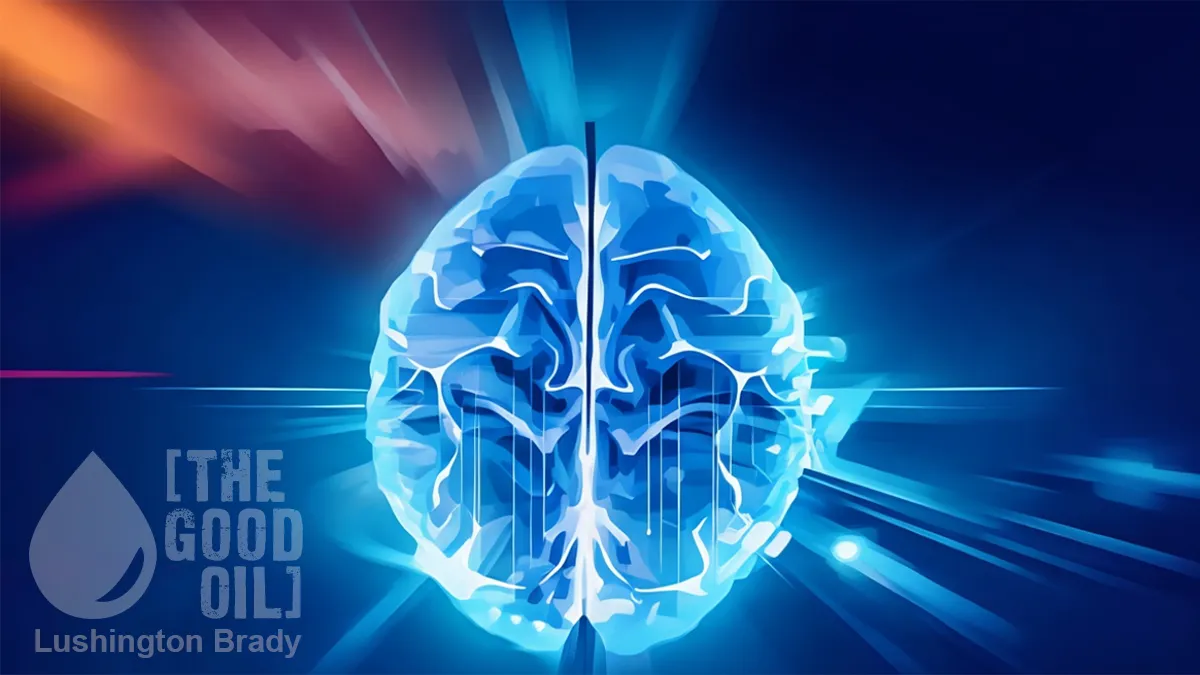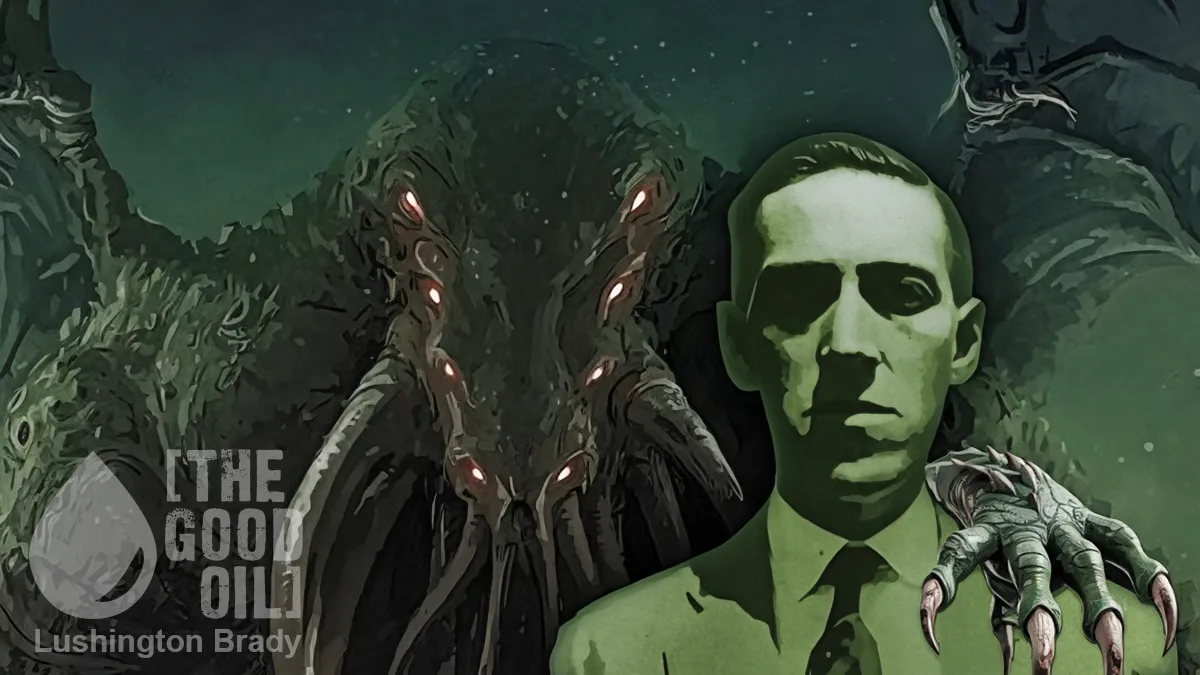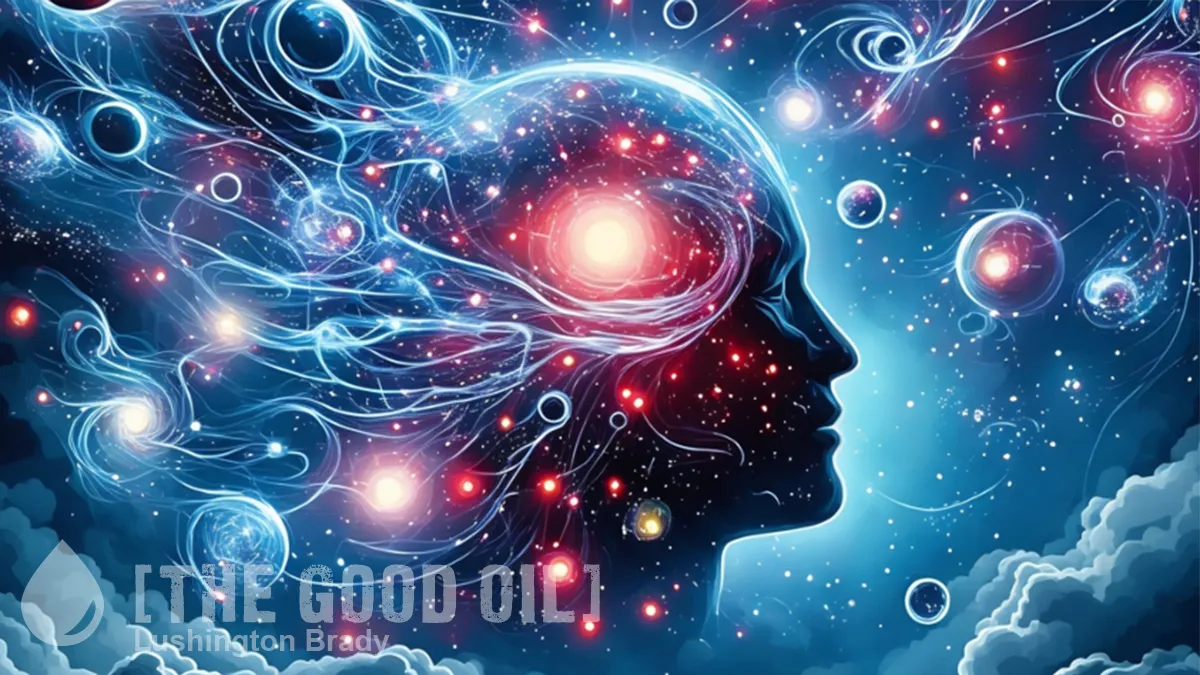Table of Contents
As I wrote recently for Real Good Oil, scientists and philosophers are nowhere near understanding consciousness. For all the excitable claims of neuroscience, at best the most advanced diagnostic tools can tentatively point to ‘neural correlates of consciousness’: that is, the brain processes that appear to be correlated with conscious experience.
But, while these appear to be a necessary condition for consciousness, they are far from sufficient. To understand the difference, consider that having legs is a necessary condition for riding a bicycle, but on its own, not sufficient. A bicycle, not to mention the balance and skill to ride it, are also needed.
What about non-human consciousness? It seems, in principle, possible that non-human animals, even machines, could conceivably achieve consciousness. But how? Where does consciousness come from?
This is a fertile field for speculation, both plausible and wildly implausible.
A baffling new theory to explain human consciousness has suggested it comes from hidden dimensions and is not just brain activity.
A physicist claimed that we plug in to these invisible planes of the universe when making art, practicing science, pondering philosophy or dreaming, and this could explain the phenomenon that has evaded scientific understanding for centuries.
Michael Pravica, a professor of physics at the University of Nevada, Las Vegas, has based the wild idea on hyperdimensionality, the idea that the universe is made up of more dimensions than just the four we perceive: height, length width and time […]
He suggested that in moments of heightened awareness, like when we enter a dream state or use our brains for deeply creative or intellectual tasks, our consciousness could transcend our physical dimension and enter a higher plane.
In these moments, our consciousness syncs with hidden dimensions and receives a flood of inspiration, Pravica said.
Hyperdimensionality at least has some hard scientific basis. String theory is a theory of hyperdimensionality, requiring up to 10 dimensions (or more) for its mathematics to work. Our consciousness, Pravica says, may be able to tap into these otherwise hidden dimensions. Physicist Roger Penrose also suggests that quantum-level processes in brain structures called microtubules may be the seat of consciousness.
One thing we know is that, at some point in our evolution, humans were no more fully conscious than other animals. Then, at some point, we became fully conscious. Philosopher Julian Jaynes argued that this crucial development took place some time between the composition of the Iliad and the Odyssey. Some scientists claim that prehistoric experiments in deranging the senses was the switch that turned on human consciousness.
Scientists have claimed that the consumption of the fungi psilocybin, also known as ‘magic mushrooms,’ influenced pre-human hominids’ brains six million years ago.
They analyzed dozens of studies involving psilocybin and consciousness, finding the fungi increased connectivity between networks in the frontal brain region associated with expressive language, decision-making and memory […]
The theory, proposed in 1992 by ethnobotanist Terence McKenna, suggested that the evolution from Homo erectus to Homo sapiens and the cognitive enhancement associated with this change caused by eating psilocybin mushrooms.
A Peruvian study suggested that, “the ingestion of psilocybin could have contributed to the improvement in visual abilities and the reproductive success of communities that made use of these mushrooms”. Certainly, humans made millions of years ago had a genetic adaptation that allowed our bodies to process psychoactive substances.
Those findings suggested that humans were feasting on the fungi and their bodies evolved to tolerate the chemicals.
Psilocybin could have also been ‘catalysts of mystical experiences or as drivers of cognitive processes, raises profound reflections on the ancestral interaction between human beings and their natural environment,’ the study said.
Another hypothesis is that ‘mind’ is a fundamental property of the universe, like gravity. Mind is present, to a tiny degree, in everything. Humans are neurologically complex enough that full consciousness finally emerged in our species. This hypothesis is called ‘panpsychism’. Panpsychism is far from a new idea. For thousands of years, philosophers and religious thinkers have posited the idea, from Plato’s ‘World Mind’, to the kami of Shintoism.
Now, it’s getting a new lease of life, with some scientists warming to the concept.
The inability of empirical sciences to figure out why and how matter gives rise to the experiences of consciousness has recently rekindled an interest in panpsychism. So have developments in the fields of neuroscience, psychology, and quantum physics.
In 2004, Italian neuroscientist and psychiatrist Giulio Tononi, Ph.D., proposed the integrated information theory of consciousness, which says that consciousness is widespread and can be found even in some simple systems […]
Well-known biologist and author Rupert Sheldrake, Ph.D., believes […] it’s an irrefutable fact that not only do we humans have consciousness, but the whole galaxy has consciousness, too […]
“Consciousness does not need to be confined to brains,” Sheldrake says. “The link between minds and physical systems seems to be through rhythmic electromagnetic fields, which of course are present in our brains.”
Sheldrake is cetainly not afraid to take his hypothesis to its logical conclusions, bizarre as they may seem.
“They are also present in and around the sun, and these could be the interface between the solar mind and the body of the sun.” So, if the sun is conscious, it’s likely to be aware of activities within the solar system, continues Sheldrake, including here on Earth, and also of its relationship with other stars within the galaxy and the galaxy as a whole.
Faced with science’s inability to satisfactorily explain consciousness, some simply deny that it exists at all.
Keith Frankish, PhD, a professor of philosophy at the University of Sheffield [says…]
“Whereas panpsychists think that consciousness is everywhere, I think that consciousness—of the non-functional, inner glow kind—is nowhere,” he explains. “Consciousness doesn’t exist, and we only think it does because we are under a sort of illusion about our own minds, a view I call illusionism,” he continues. In other words, we humans have vastly extended the power of our biological brains and, through powerful tricks like self-manipulation or solid problem-solving skills, we have convinced ourselves we have a unified, conscious mind, a self, a soul – but it’s all an illusion, according to Frankish.
Yet, that is not at all what consciousness feels like. As Descartes famously said, if I know nothing else, I know that I think. Therefore, I am – so is my consciousness.









